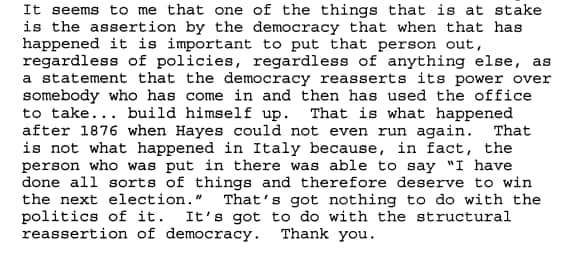The Volokh Conspiracy
Mostly law professors | Sometimes contrarian | Often libertarian | Always independent
More on Judge Kopf: The Calabresi precedent
I wasn't planning to blog any more on Judge Kopf's statements that Presidential candidate Ted Cruz is "unfit" for the Presidency. But I came across a precedent that may be helpful to those interested in whether Judge Kopf violated the ethics rules, and specifically the Code of Conduct ban on judges publicly opposing a candidate for public office. The precedent is a 2005 ruling from the Judicial Council of the Second Circuit involving misconduct claims filed against Judge Guido Calabresi. The Judicial Council ruled that Judge Calabresi had violated this same ethics rule during the 2004 American Constitution Society convention.
Here's the context. Calabresi was commenting from the audience at the end of an ACS panel about the upcoming Presidential election, in which George W. Bush was seeking a second term. Judge Calabresi explained that, as a judge, he could not "talk politics." However, Bush's reelection raised a "deeper structural issue" that was "at stake" in the forthcoming election. President Bush had come to office the first time in an illegitimate way, Judge Calabresi argued, much like Mussolini and Hitler. In Bush's case, the Supreme Court had wrongly made him President in Bush v. Gore. Politics aside, Calabresi argued, the way Bush came to office called for a "structural reassertion of democracy" when Bush came up for reelection:

Judge Calabresi apologized soon after, explaining that he had been trying to make a theoretical argument about democracy rather than weigh in on the election - but that he understood his words could reasonably be construed as so weighing in.
In its decision, the Judicial Council of the Second Circuit had little difficulty finding that Judge Calabresi had violated Canon 5 (then numbered Canon 7, but with the same text as Canon 5 today). The decision doesn't go into detail about why, although it characterizes the violation as "clear and serious." Perhaps the violation was deemed so obvious that it didn't merit discussion. In any event, the decision spends most of its time discussing the proper punishment for the "clear and serious" violation of the ethics rule.
The timing of the Calabresi decision is particularly interesting in light of Judge Kopf's statement that he he is very knowledgeable about the ethics rules:
I might add that I stand by [my] views after serving six years on the Judicial Conference's Codes of Conduct Committee. That hardly makes me right, but it does reflect a serious study of the Code of the Conduct for United States Judges.
Kopf's bio states that he was a member of that committee from 2006 to 2012. Perhaps the Calabresi misconduct decision escaped his attention because it was handed down the year before he joined the Committee. Or perhaps Judge Kopf knows of the decision and thinks it is distinguishable (or just not binding because he's not in the Second Circuit). I don't know.
To be clear, I don't think this is the biggest problem in the world. I have no view of what the proper punishment should be, if any at all, if a misconduct complaint is filed against Judge Kopf. And as I said yesterday, I don't support Cruz's proposal either. But if Judge Calabresi's argument about the need for a "structural reassertion of democracy" in the 2004 Presidential election constitutes a "clear and serious" violation of Canon 5, then I would think that's also true about Judge Kopf's argument that Cruz is "unfit" for the Presidency.
UPDATE: In a new post in part directed to me, Judge Kopf agrees that he violated the rule under the Calabresi decision:
The decision of the Second Circuit is not, strictly speaking "precedent," and Judge Calabresi's comments contained such statements as "In this case, like Mussolini, he [President Bush] has exercised extraordinary power" and "Bush's reelection raised a 'deeper structural issue' that was 'at stake' in the forthcoming election." Nevertheless, I have concluded that (1) the holding of the Calabresi opinion would likely be applied to me if an ethics complaint was filed in the Eighth Circuit; and (2) you are correct, based upon the holding of the Calabresi decision, that I violated Canon 5(A)(2) ("A judge should not . . . publicly endorse or oppose a candidate for public office.")
It's not clear to me that Judge Kopf necessarily agrees with the Calabresi decision. But I appreciate his agreement that, in light of it, a likely application of the ethics canon would conclude that he violated it.


Show Comments (0)